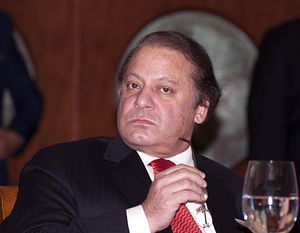After spearheading a coalition of nine Arab states to bomb Yemen’s Houthi rebels for the past several weeks, Saudi Arabia is trying to attract new partners. It has a good case to recruit Pakistan to join the fight: the Saudis have spent lavishly to cultivate Islamabad as a military ally, recently sending over $1.5 billion in economic aid.
Riyadh attempted to cash in on that commitment in early April, formally requesting Pakistan’s assistance in its campaign in Yemen. But when Pakistan’s parliament took up the matter two weeks ago, not a single member of the national assembly or the senate supported intervention. That decision didn’t take place in a vacuum, either: prior to the vote, Iranian Foreign Minister Mohammad Javad Zarif visited Islamabad to counsel Prime Minister Nawaz Sharif and Pakistan’s Army Chief of Staff Raheel Sharif against authorizing the use of military force in Yemen.
The war in Yemen has put Pakistan at the center of Riyadh and Tehran’s power struggle in the region. What does this mean for Pakistan’s role in the Persian Gulf?
The vote marks a major shift in the relationship between Islamabad and Riyadh. Pakistan has a long history of military cooperation with Saudi Arabia, basing thousands of troops there during the 1991 Gulf war. Sharif himself found refuge in Saudi Arabia after he was exiled in a military coup 16 years ago.
But Riyadh’s sectarian jostling with Iran has deeply impacted Pakistan since then. While Islamabad maintains strong economic and military ties with Saudi Arabia, it recognizes the rising power of Iran. Complicating matters further, the two countries share a 565-mile border.
Pakistan, which has the world’s second-largest Shia population, fears that intervening in Yemen could deepen sectarian conflict within its own borders. Shireen Marazi, a prominent Pakistani politician, expressed fears that sending troops into Yemen would worsen sectarian tensions within the country. The growing Shiite minority could erupt in protest, especially if the conflict in Yemen further ignites religious tensions.
Pakistan is also wary that intervention could kill a proposed natural gas pipeline project between Iran and Pakistan. This proposed pipeline would supply Pakistan with enough energy to bridge its current electricity shortfall. While Iran has completed its half of the pipeline, Pakistan has refrained from continuing construction, fearing U.S.-imposed trade sanctions for cooperating with Tehran. Under the current framework of the nuclear deal between Iran and the P5+1 group of powers, among the first sanctions lifted by West would be those on Iranian energy exports.
The vote for neutrality and its affirmation by Prime Minister Nawaz Sharif demonstrates Pakistan’s commitment to the pipeline plan and to better relations with Iran in the future. Intervening in Yemen against the Houthis, with the Iran nuclear deal in flux, could agitate a vital ally.
Pakistan’s decision to remain neutral in Yemen’s conflict shows that its approach in the Persian Gulf and the Arabian Peninsula is a challenging balancing act. The struggle between Iran and Saudi Arabia has manifested itself in war zones throughout the Middle East, including in Yemen, Iraq, and Syria. Those conflicts, and the friction they cause between Tehran and Riyadh, will make it tough for Pakistan to find a middle ground in its foreign policy.
Saagar Enjeti is a policy and data analyst in New York City.

































